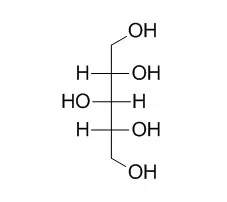| In vitro: |
| Arch Oral Biol. 2015 Mar 30;60(7):998-1006. | | The effects of xylitol and sorbitol on lysozyme- and peroxidase-related enzymatic and candidacidal activities.[Pubmed: 25874813] | To investigate whether Xylitol and sorbitol affect enzymatic and candidacidal activities of lysozyme, the peroxidase system, and the glucose oxidase-mediated peroxidase system.
METHODS AND RESULTS:
Xylitol and sorbitol were added to hen egg-white lysozyme, bovine lactoperoxidase, glucose oxidase-mediated peroxidase, and whole saliva in solution and on hydroxyapatite surfaces. The enzymatic activities of lysozyme, peroxidase, and glucose oxidase-mediated peroxidase were determined by the turbidimetric method, the NbsSCN assay, and production of oxidized o-dianisidine, respectively. Candidacidal activities were determined by comparing colony forming units using Candida albicans ATCC strains 10231, 11006, and 18804.
While Xylitol and sorbitol did not affect the enzymatic activity of hen egg-white lysozyme both in solution and on hydroxyapatite surfaces, they did inhibit the enzymatic activity of salivary lysozyme significantly in solution, but not on the surfaces. Xylitol and sorbitol enhanced the enzymatic activities of both bovine lactoperoxidase and salivary peroxidase significantly in a dose-dependent manner in solution, but not on the surfaces. Sorbitol, but not Xylitol, inhibited the enzymatic activity of glucose oxidase-mediated peroxidase significantly. Both Xylitol and sorbitol did not affect candidacidal activities of hen egg-white lysozyme, the bovine lactoperoxidase system, or the glucose oxidase-mediated bovine lactoperoxidase system.
CONCLUSIONS:
Xylitol and sorbitol inhibited salivary lysozyme activity, but enhanced both bovine lactoperoxidase and salivary peroxidase activities significantly in solution. Xylitol and sorbitol did not augment lysozyme- and peroxidase-related candidacidal activities. | | J Periodontol. 2014 Jun;85(6):e212-23. | | Xylitol, an anticaries agent, exhibits potent inhibition of inflammatory responses in human THP-1-derived macrophages infected with Porphyromonas gingivalis.[Pubmed: 24592909] | Xylitol is a well-known anticaries agent and has been used for the prevention and treatment of dental caries. In this study, the anti-inflammatory effects of Xylitol are evaluated for possible use in the prevention and treatment of periodontal infections.
METHODS AND RESULTS:
Cytokine expression was stimulated in THP-1 (human monocyte cell line)-derived macrophages by live Porphyromonas gingivalis, and enzyme-linked immunosorbent assay and a commercial multiplex assay kit were used to determine the effects of Xylitol on live P. gingivalis-induced production of cytokine. The effects of Xylitol on phagocytosis and the production of nitric oxide were determined using phagocytosis assay, viable cell count, and Griess reagent. The effects of Xylitol on P. gingivalis adhesion were determined by immunostaining, and costimulatory molecule expression was examined by flow cytometry.
Live P. gingivalis infection increased the production of representative proinflammatory cytokines, such as tumor necrosis factor-α and interleukin (IL)-1β, in a multiplicity of infection- and time-dependent manner. Live P. gingivalis also enhanced the release of cytokines and chemokines, such as IL-12 p40, eotaxin, interferon γ-induced protein 10, monocyte chemotactic protein-1, and macrophage inflammatory protein-1. The pretreatment of Xylitol significantly inhibited the P. gingivalis-induced cytokines production and nitric oxide production. In addition, Xylitol inhibited the attachment of live P. gingivalis on THP-1-derived macrophages. Furthermore, Xylitol exerted antiphagocytic activity against both Escherichia coli and P. gingivalis.
CONCLUSIONS:
These findings suggest that Xylitol acts as an anti-inflammatory agent in THP-1-derived macrophages infected with live P. gingivalis, which supports its use in periodontitis. |
|
| In vivo: |
| Pediatrics. 1998 Oct;102(4 Pt 1):879-84. | | A novel use of xylitol sugar in preventing acute otitis media.[Pubmed: 9755259] | Xylitol, a commonly used sweetener, is effective in preventing dental caries. As it inhibits the growth of pneumococci, we evaluated whether Xylitol could be effective in preventing acute otitis media (AOM).
METHODS AND RESULTS:
Altogether, 857 healthy children recruited from day care centers were randomized to one of five treatment groups to receive control syrup (n = 165), Xylitol syrup (n = 159), control chewing gum (n = 178), Xylitol gum (n = 179), or Xylitol lozenge (n = 176). The daily dose of Xylitol varied from 8.4 g (chewing gum) to 10 g (syrup). The design was a 3-month randomized, controlled trial, blinded within the chewing gum and syrup groups. The occurrence of AOM each time the child showed any symptoms of respiratory infection was the main outcome.
Although at least one event of AOM was experienced by 68 (41%) of the 165 children who received control syrup, only 46 (29%) of the 159 children receiving Xylitol syrup were affected, for a 30% decrease (95% confidence interval [CI]: 4.6%-55.4%). Likewise, the occurrence of otitis decreased by 40% compared with control subjects in the children who received Xylitol chewing gum (CI: 10.0%-71.1%) and by 20% in the lozenge group (CI: -12.9%-51.4%). Thus, the occurrence of AOM during the follow-up period was significantly lower in those who received Xylitol syrup or gum, and these children required antimicrobials less often than did controls. Xylitol was well tolerated.
CONCLUSIONS:
Xylitol sugar, when given in a syrup or chewing gum, was effective in preventing AOM and decreasing the need for antimicrobials. |
|






 Cell. 2018 Jan 11;172(1-2):249-261.e12. doi: 10.1016/j.cell.2017.12.019.IF=36.216(2019)
Cell. 2018 Jan 11;172(1-2):249-261.e12. doi: 10.1016/j.cell.2017.12.019.IF=36.216(2019) Cell Metab. 2020 Mar 3;31(3):534-548.e5. doi: 10.1016/j.cmet.2020.01.002.IF=22.415(2019)
Cell Metab. 2020 Mar 3;31(3):534-548.e5. doi: 10.1016/j.cmet.2020.01.002.IF=22.415(2019) Mol Cell. 2017 Nov 16;68(4):673-685.e6. doi: 10.1016/j.molcel.2017.10.022.IF=14.548(2019)
Mol Cell. 2017 Nov 16;68(4):673-685.e6. doi: 10.1016/j.molcel.2017.10.022.IF=14.548(2019)